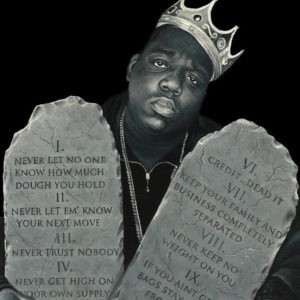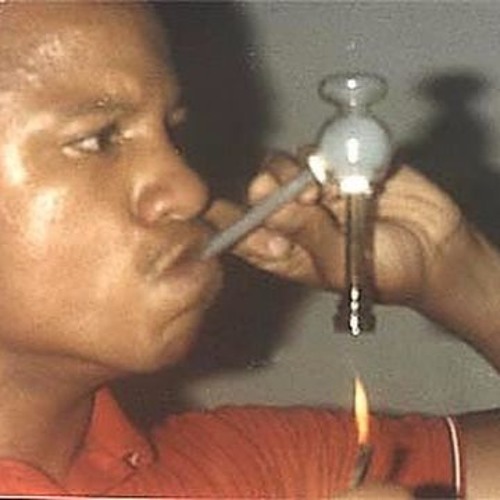On March 25, 1997, American rapper The Notorious B.I.G. (a.k.a. Biggie Smalls) dropped a song that would become iconic, not just in the hip hop community, but in American culture as a whole.
The Ten Crack Commandments is arguably the most popular track on Christopher Wallace a.k.a “Biggie’s” last studio album, Life after Death. The song was not even a single, yet itwas so popular that Lin-Manuel Miranda did a remix of it to create the song “The Ten Duel Commandments” for his smash hit musical Hamilton.
It’s also received a number of remasters, my favorite one being on the Youtube released “Life After Deathstar” album; a collection of Biggie’s songs that were remixed with a Star Wars tracks.
The first line in The 10 Crack Commandments goes:
“I been in this game for years. It made me an animal; there’s rules to this sh**t. I wrote me a manual. A step-by-step booklet for you to get your game on track, not yo wig pushed back.”
On the surface, the song is a how-to manual for being a successful drug dealer. However, the lessons contained in the song don’t just apply to selling crack. For Biggie and other drug dealers like him, crack was everything. Not because they were addicted to it, but because it provided an income and a way of life.
The Ten Crack Commandments is an education in human nature’s real, raw, viciousness. The level of street smarts required to survive in an environment like this breeds several lessons for managing competition.
I’ve broken down each of the 10 crack commandments so you get the benefits of these hard-earned, deeper lessons about business, human nature, and life without ever having to sell drugs yourself.
When you’re street smart, money’s your report card
—Jadakiss
Business and life lessons from The Notorious B.I.G.’s 10 crack commandments

1. Never let anyone know how much money you have.
Rule Number Uno, never let no one know
How much dough you hold cause you know
The cheddar breed jealousy ‘specially
If that man fucked up, get yo’ ass stuck up
The only thing that will make a person hate you more than doing better than them is if you openly display and celebrate your success.
What starts as mere envy often transforms into outright sabotage of your life and career. The motivation for this hate stems from a scarcity mentality and a lack of competitive drive.
[Read: The 5 reasons why people hate you]
The scarcity mentality makes a person believe that everything is a zero-sum game.
Your victory in life automatically means their defeat–even if you aren’t in the same field. Your continued success activates deeply seeded insecurities about their abilities.
Whether they try to damage you physically, mentally, or emotionally, eventually you’ll “get yo’ ass stuck up” by a hater. They think it’s better to beat you outside the game than to try and beat you in competition.
It’s best to be secretive about your success until you are in a sufficient position to not be affected by their jealous attacks.
The most dangerous enemies aren’t the ones who openly oppose you. The ones who do the most damage are those whose loving embrace conceals their raging envy.
2. Never let anyone know what your next move will be
Number 2, never let ‘em know your next move
Don’t you know Bad Boys move in silence and violence?
Take it from your highness
I done squeezed mad clips at these cats for their bricks and chips
The element of surprise will always be your greatest advantage.
Regardless of other imbalances in ability, the one who acts first has the greater advantage. The longer it takes the opposition to mount a counter, the more easily you can achieve your objective.
If it looks like you’re gonna be in a street fight & there’s no way to run, throw the 1st blow. Better to be judged by 12 than carried by 6 (Read: How to avoid a street fight and what to do if you can’t). Also, tell as few people as necessary about your plans. This eliminates the possibility of your plans being revealed to your opponents so they can counter you.
Lastly, remember this: Lightning doesn’t strike the same place twice.
Many opportunities only present themselves once. Certain vulnerabilities will not be open again. The moment your plan to exploit it is revealed, then it will disappear.
Real G’s move in silence like lasagna
—Lil’ Wayne
3. Trust no one
Number 3, never trust no-bo-dy
Your moms’ll set that ass up, properly gassed up
Hoodied and masked up, shit, for that fast buck
She be laying in the bushes to light that ass up
When you’re young, secrets feel like something you share with friends. The older you get, the more you recognize their value. The fewer people know something, the fewer people you have to worry about telling someone who can thwart your plans.
This is especially true when it comes to incentives.
As the old saying goes, “Everyone is a whore for the right price.” Even your mother will give up the goods on you if the money is right or the leverage is tight. The only way to protect yourself is to make sure that no one knows anything about what you’re doing.
Combine this with the second rule for supreme secrecy and information control.
4. Never use what you sell
Number 4, I know you heard this before
Never get high on your own supply
Whatever you’re selling, it’s important that you don’t become an overindulgent customer. Your desire should never interfere with profits. It’s obvious when talking about selling alcohol or drugs, but let’s start there and extend the idea to other vices.
Imagine being a drug dealer who is addicted to the drug he’s selling. Every day he confronts a difficult dilemma: to chase a high or chase dollars. The two goals are mutually exclusive. Now imagine something benign, like physical training.
While it’s important that you’re in shape, you can’t spend so much time working out that you have none left to service clients. If your goal is business success, you need to do the minimum to remain a viable choice and focus the efforts that will generate revenue.
The main lesson here is that it’s difficult—if not impossible—to be both a producer and consumer of a product.
The more time you spend making things, the less time you have to enjoy the things you make.
The more you enjoy what someone else makes, the less time you have to make something of your own.
5. Don’t mix business and pleasure
Number 5, Never sell no crack where you rest at
I don’t care if they want a ounce, tell ‘em bounce!
The warning here is to never sell drugs where you live because unsatisfied customers and rival drug dealers are likely to seek you out where you sell. If you live where you do business, then not only is your home put in danger, but you also introduce the possibility of collateral damage and innocent bystanders whom you care about getting attacked in a retaliation
Fortunately, the potential penalty for working where you live isn’t nearly as severe if you do legal work. However, it does come with its own problems and challenges.
One of the issues we observed during the Covid-19 pandemic was how many people had trouble adjusting to working from home. One of the major complaints is that their employer expected them to always be available. Also, many people felt distracted by problems around the house.
Whenever you leave work, leave work. Whenever you leave your personal life, leave your personal life.
A clear line between the two is best for your sanity and boundaries. This goes double if you work for yourself, as it’s easy to convince yourself that you have to always be working.
6. Don’t do work on credit
Number 6, that goddamn credit? Dead it
You think a crackhead paying you back, shit forget it!
Crackheads are unreliable. They can hustle when they need to get money for crack, but they’re still unreliable.
[Read: How to hustle like a crackhead]
I don’t think anyone needs to be specifically warned against loaning crackheads money. However, Biggie felt it was necessary to include this commandment. Why?
For a drug dealer, it’s easy to assume that his reputation for violence (or the violence of the general violence of the drug trade) would inspire addicts to pay him back, so he may be allured into giving drugs on credit. I’d imagine it doesn’t take long for a street dealer to realize that addiction is stronger than common sense.
Addicts only think in the short term.
They will do whatever they can to secure relief from their cravings. When we apply this rule to our personal and business life, there is almost certainly a higher degree of confidence in getting your money, but there is a major parallel to the drug game that must be respected in your personal life.
If a drug dealer gives drugs on credit, he can’t repossess those drugs if the user doesn’t pay him back. Violence is a deterrent, not a means of collection, so he’s still out.
Similarly, avoid doing any work on credit and get your payment upfront. The time you invest into doing the work can’t be recovered if they stiff you. However, they are protected, in that if they feel like your work is unsatisfactory they can file a chargeback with their bank or credit card company.
This is the other side of the 10th commandment. Don’t take on debt you can’t pay back and don’t do work on credit unless you absolutely have to.
[Read: 9 Lessons from living next to crackheads and crackdealers]
7. Family/business separation
7, this rule is so underrated
Keep your family and business completely separated
Money and blood don’t mix like 2 dicks and no bitch
Find yourself in serious shit
This might be the only rule in the 10 crack commandments that people disagree with. First, the rule is pretty straightforward: don’t get the family involved with the business.
People typically think of this situation as not hiring or working with family members. The pushback is that some of the world’s most profitable and fulfilling businesses have been started with family members.
Working with family typically comes with a type of trust and reliability that you can’t hire and money can’t buy. However, there will be problems if your family isn’t on the same page as you, in terms of ambition, ability, or emotions.
If you’re not careful, the disagreements you have in your personal life will manifest themselves in your business relationships—and vice-versa.
However, if the relationship you have with your family is strong, then you’ll be able to do great things—even greater than the things you could if you worked with other highly competent people who aren’t related to you.
This commandment falls into more of a “warning” category than outright advisement against.
If you have someone you’re close with who is going through a tough time, it might seem like the right thing to do to help get them a job with you or hire them, but if things go sour, it will ruin your relationship.
8. Protect yourself from liabilities
Number 8, never keep no weight on you!
Them cats that squeeze your guns can hold jums too
This is one of those pieces of advice that reads right out of Niccolo Machiavelli’s classic, The Price. Before you can appreciate the brilliance of this piece of advice, most of you will need some translation.
[Read: Big ideas and quotes from Niccolo Machiavelli’s “The Prince”]
“Jums” is short for “jumbos”. Jumbos are the name for roughly $20 worth of crack. Ironically, Biggie was arrested for breaking this rule in 1991. He was arrested for selling crack cocaine in North Carolina and spent nine months in jail before making bail.
As for “them cats that squeeze your guns“, he‘s referring to the “muscle“, “goons“, “shooters“, or bodyguards that a drug dealer must employ to stay safe in the dangerous game of street hustling.
So specific to the drug game, he‘s telling you there‘s no reason for you ever to have drugs on your person. As the leader, there‘s no reason for you to risk being picked up by the police and found with any drugs on your person.
Just like Generals don‘t actually do the fighting, drug dealers shouldn‘t be doing the dealing. The risk is too great.
Applied to your life and business, you need to do whatever you can to protect yourself from liability.
In your personal life, this means never texting or messaging anything you can‘t stand by personally and not spending time with the wrong types of people who increase your chances of being harmed. Commandment number 9 dives even deeper into this idea.
In your business life, this means that you should have insurance, operate from behind an LLC, keep meticulous records, make sure your return policy is clearly stated, etc.
Do everything you can to protect yourself from the inevitable downside and negative externalities that come from being in business.
9. Watch the company you keep
Number 9 shoulda been Number 1 to me
If you ain’t gettin’ bagged stay the fuck from police
If niggas think you snitchin’ they ain’t trying to listen
They be sittin’ in your kitchen, waiting to start hittin’
Specifically, Biggie is warning that if you are seen around the police and you aren’t getting arrested, then your drug-dealing comrades will think you’ve struck some type of deal and are an informant. They aren’t going to wait around to find out if their suspicions are accurate or not, so from that point on, you’re living on borrowed time.
Generally speaking, applied to your life, this is a stern warning about watching the company you keep and maintaining your reputation. There is a saying I live by: “Where there’s smoke, there’s fire.” This means that if there are signs that you did something wrong, then people will assume that you did something wrong.
They aren’t going to wait until they see the fire. They’re going to use the smoke as a warning system to protect themselves.
Suppose you follow this rule in your personal life. In that case, you are far less likely to be accused of something you didn’t do and if you actually did something you don’t want to take responsibility for, living by this code makes it easier for you to evade suspicion.
A bad reputation will get you blamed for something you didn't do.
— Ed Latimore (@EdLatimore) August 23, 2020
A good reputation will let you get away with murder.
Plan accordingly.
10. Don’t take on debt you can’t handle
Number 10, a strong word called consignment
Strictly for live men, not for freshmen
If you ain’t got the clientele, say “hell no!”*
Cause they gon’ want they money rain sleet hail snow
If a “plug” or drug supplier has enough confidence in a dealer, he may give him drugs in a consignment type of deal. What this means is that the supplier will give the dealer the product and he will only pay a predetermined fixed price after he’s sold it.
This is also known as “fronting work” and is also requested by a dealer who is low on money but has the clientele or connections to turn a profit on it after he pays back what he owes the plug.
In and of itself, this isn’t a bad practice. It buys you time, keeps you in the game, and—depending on your business savvy, position in the market, and general know-how—allows you to make more money than you would have if you bought the product upfront.
However, this comes with a danger: if you don’t sell enough of the product to cover what you took out. Best case, you can’t ever do consignment again. Worst case, they take the money out of your knee caps or life.
This is no different than any other debt you take on.
In the event of a default, the best case scenario is that they don’t let you take anymore until you pay it back and demonstrate you can handle your debt responsibly. The worst case scenario is that you still have to pay it back AND you lose your home or car.
Be honest with yourself. If you know that you don’t have the skillset, resources, or the work ethic to pay back a debt, don’t take it out. You may find yourself dealing with even bigger problems had you just remained without.




